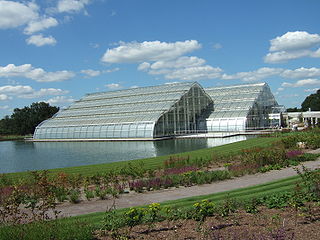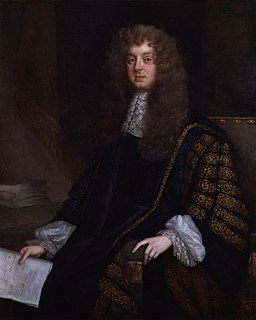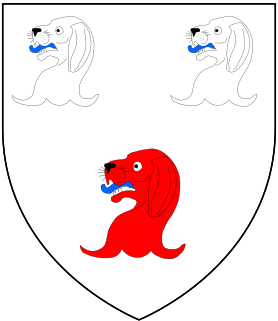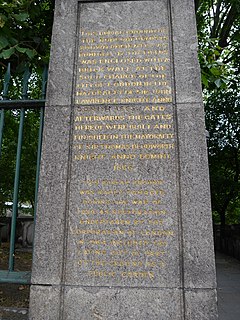
Tulse Hill is a district in the London Borough of Lambeth in South London that sits on Brockwell Park. It is approximately five miles from Charing Cross and is bordered by Brixton, Dulwich, Herne Hill, Streatham and West Norwood.

Wisley is a village and civil parish in Surrey, England between Cobham and Woking, in the Borough of Guildford. It is the home of the Royal Horticultural Society's Wisley Garden. The River Wey runs through the village and Ockham and Wisley Commons form a large proportion of the parish on a high acid heathland, which is a rare soil type providing for its own types of habitat. It has a standard weather monitoring station, which has recorded some national record high temperatures.

The Royal African Company (RAC) was an English mercantile (trading) company set up in 1660 by the royal Stuart family and City of London merchants to trade along the west coast of Africa. It was led by the Duke of York, who was the brother of King Charles II and in 1685, York took the throne as James II. The RAC shipped more African slaves to the Americas than any other company in the history of the Atlantic slave trade, and was owned entirely by the British Crown.
Sir Gilbert Heathcote, 1st Baronet, was a British merchant and Whig politician who sat in the English and British House of Commons between 1701 and 1733. He was a Governor of the Bank of England and was Lord Mayor of London in 1711.

Sir Robert Clayton (1629–1707) was a British merchant banker, politician and Lord Mayor of London.
Sir Thomas Bloodworth, born Blidward, also spelt Bludworth was an English merchant and politician who sat in the House of Commons from 1660 to 1679. He was Lord Mayor of London from October 1665 to October 1666 and his inaction during the early stages of the Great Fire of London was widely criticised as one of the causes of the great extent of the damage to the city.

Sir Edward Seymour, of Berry Pomeroy, 4th Baronet, MP was a British nobleman, and a Royalist and Tory politician.

Sir Charles Duncombe of Teddington, Middlesex and Barford, Wiltshire, was an English banker and Tory politician who sat in the English and British House of Commons between 1685 and 1711. He served as Lord Mayor of London from 1708 to 1709. He made a fortune in banking and was said to be worth £400,000 later in life, and the richest commoner in England on his death.
Sir William Ashhurst or Ashurst was an English banker and Whig politician who sat in the English and British House of Commons between 1689 and 1710. He served as Lord Mayor of London for the year 1693 to 1694.

Sir John Cass was an English merchant, Tory Member of Parliament and philanthropist. He was also a key figure in the Royal African Company, which was involved in the Atlantic slave trade.
Sir Humphrey Winch, 1st Baronet was an English politician who sat in the House of Commons between 1660 and 1689.
John Jolliffe was an English merchant and politician who sat in the House of Commons from 1660 to 1679.

Sir Thomas Pilkington was an English merchant, politician and Lord Mayor of London.

Sir William Pritchard or Prichard (1632?–1705) was an English merchant, slave trader and politician, Lord Mayor of London in 1682.

Sir John Lawrence was an English merchant who was Lord Mayor of London from 1664 to 1665. He was therefore Lord Mayor during the period of the Great Plague of London.

Sir William Billers was an English haberdasher who was Alderman, Sheriff and Lord Mayor of London.

Sir John Parsons of The Priory, Reigate, Surrey, was an English brewer, Royal Navy victualler and Tory politician, who sat in the English and British House of Commons between 1685 and 1717. He was Lord Mayor of London in 1703.

Sir Benjamin Bathurst was a British politician, a slave trader, a Governor of the East India and Levant companies and a Cofferer of the Royal Household.
Sir Robert Bedingfield (1637–1711) of Ludgate Street, London, was a British merchant and politician who sat in the House of Commons in 1701. He was Lord Mayor of London in 1706.
Sir Edward Clarke, of Brickendon, Hertfordshire, was an English merchant who served as Lord Mayor of London in the year 1696 to 1697.













